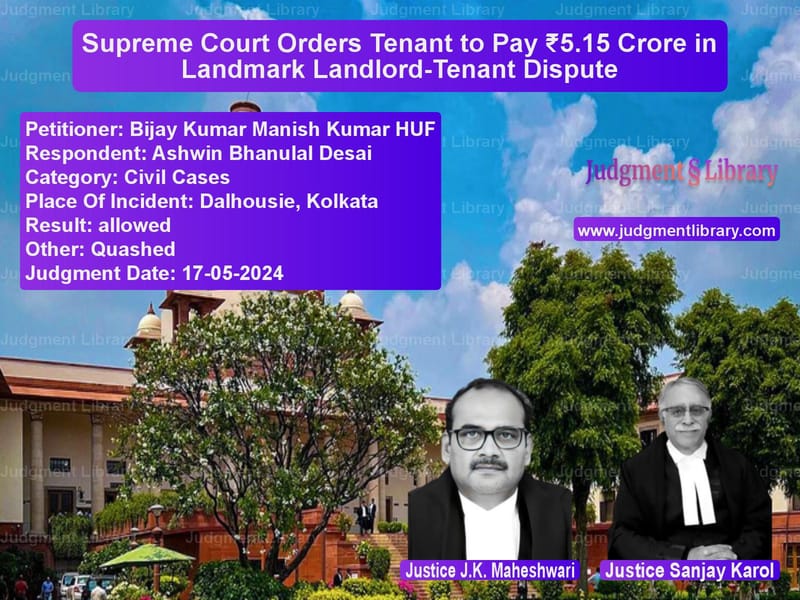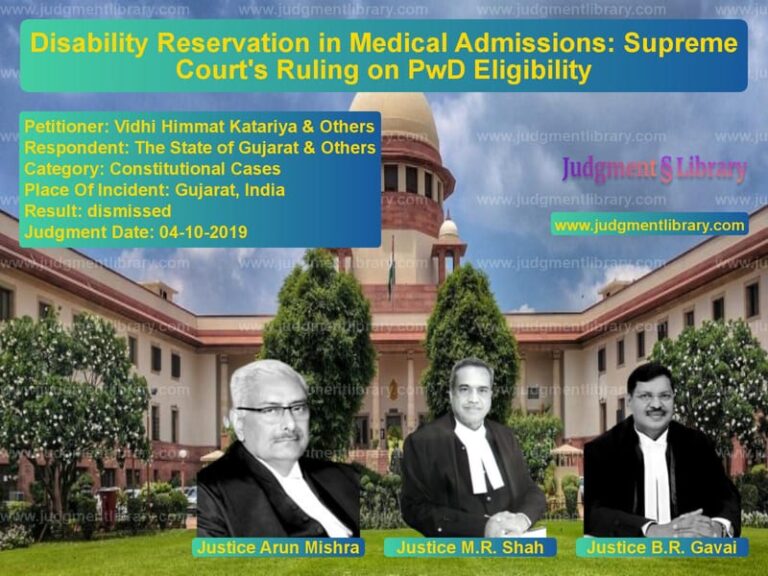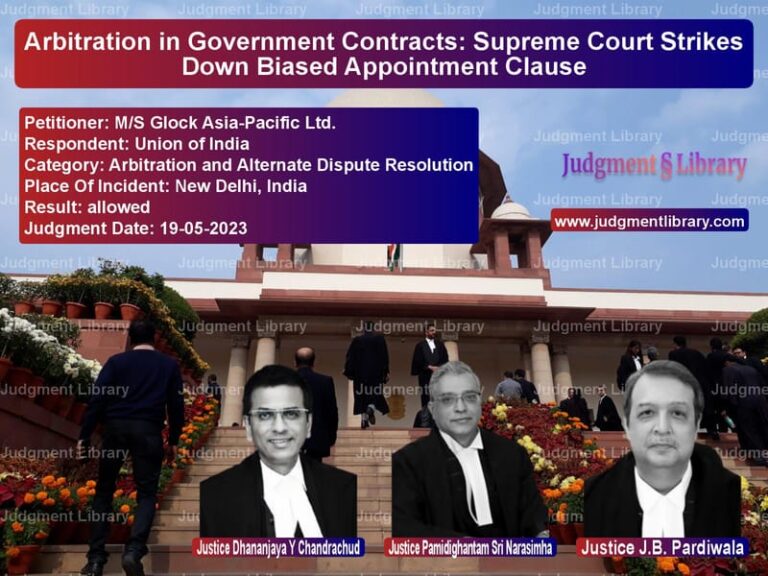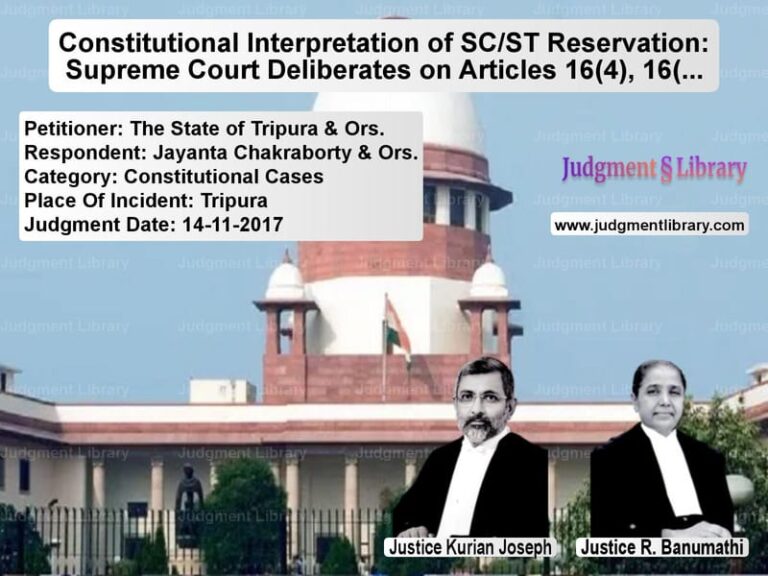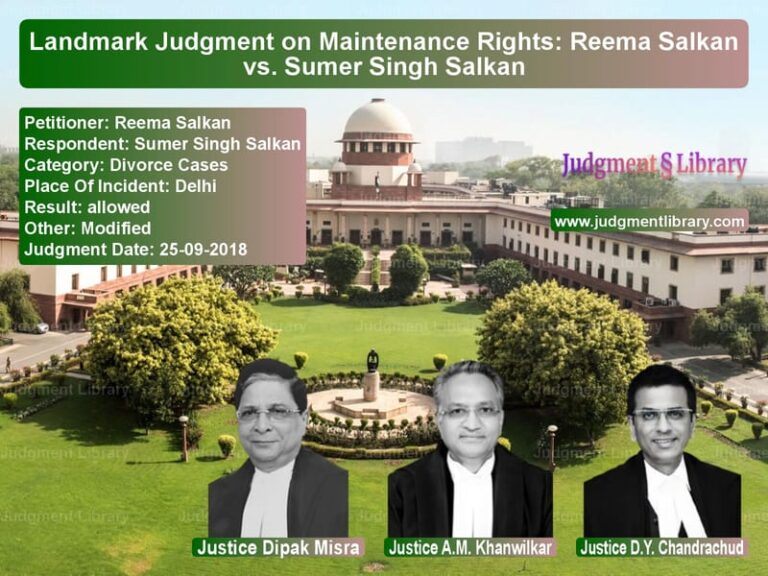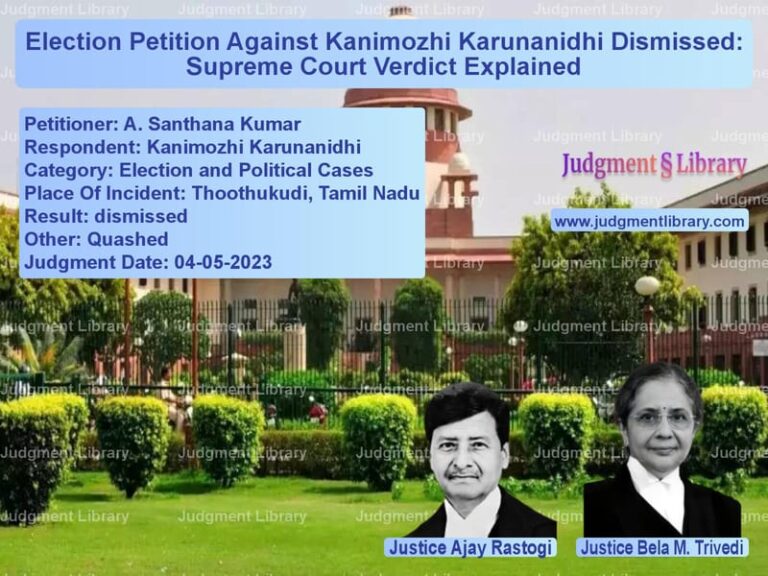Supreme Court Orders Tenant to Pay ₹5.15 Crore in Landmark Landlord-Tenant Dispute
The case of Bijay Kumar Manish Kumar HUF vs. Ashwin Bhanulal Desai is a significant ruling by the Supreme Court concerning a long-standing landlord-tenant dispute in Kolkata. The judgment, delivered on May 17, 2024, directed the tenant to deposit ₹5.15 crore as arrears and occupational charges with the Supreme Court Registry, marking a crucial development in tenancy law.
Background of the Case
The dispute arose over a commercial property in Dalhousie, Kolkata, where the petitioner-landlord had leased out the premises to the respondent-tenant under a lease agreement dated February 23, 1991. The key aspects of the case include:
- The landlord accused the tenant of non-payment of rent since 2002.
- The landlord sought eviction based on lease forfeiture due to non-payment.
- The tenant argued that the West Bengal Premises Tenancy Act, 1997, protected their tenancy.
- The case has been ongoing in courts for over two decades.
Legal Proceedings
1. Suit for Ejectment
The landlord initially filed an ejectment suit in the City Civil Court, Kolkata, under the Transfer of Property Act, 1882, seeking:
- Eviction of the tenant.
- Recovery of possession.
- Permanent injunction against alienation of the property.
The tenant, in response, filed an application arguing that the premises were governed under the West Bengal Tenancy Act, which provides greater protection to tenants.
2. Trial Court’s Ruling
The Trial Court ruled in favor of the landlord, holding that:
- The lease commenced in 1992, prior to the enactment of the West Bengal Premises Tenancy Act, 1997.
- The lease was governed by the Transfer of Property Act, 1882.
- The tenant’s claims were insufficient to bar eviction proceedings.
3. High Court’s Reversal
The tenant appealed to the Calcutta High Court, which ruled that the Tenancy Act applied, granting them protection and dismissing the landlord’s suit.
4. Supreme Court Appeal
The landlord challenged the High Court’s decision in a Special Leave Petition (SLP) before the Supreme Court. During the proceedings, the landlord:
- Offered time for the tenant to vacate, which the tenant rejected.
- Filed an Interlocutory Application seeking direction for payment of occupational charges.
Arguments by the Petitioner (Landlord)
The landlord’s counsel contended:
- The lease had been forfeited due to non-payment of rent.
- The tenant had been occupying the premises without paying rent since 2002.
- The rent in dispute was significantly lower than market rates in the commercial hub of Kolkata.
- They submitted a valuer’s report stating that the fair rent should be ₹41 per square foot.
- The total rent dues, calculated from 2007 to 2024, amounted to ₹5.15 crore.
Arguments by the Respondent (Tenant)
The tenant’s counsel argued:
- The landlord had accepted rent until August 2002 but later refused payments.
- The lease had not been legally terminated, and hence, occupational charges could not be demanded.
- The total amount due was only ₹4.40 lakh, based on past rent calculations.
- The High Court had already ruled in favor of tenancy protection under the West Bengal Premises Tenancy Act.
Supreme Court’s Observations
1. Lease Forfeiture and Tenant’s Obligation
The Court emphasized that the landlord had the right to terminate the lease due to non-payment. It stated:
“The purpose of renting out a property is to generate fair income. A tenant who continues in possession without payment cannot claim indefinite tenancy rights.”
2. Market Rent and Occupational Charges
The Court noted that the prevailing market rent in the Dalhousie area was much higher than the rent being paid by the tenant. It ruled:
“The tenant must pay fair occupational charges based on current market rates, irrespective of the lease agreement.”
3. Protection Under the Tenancy Act Does Not Apply
The Court held that the West Bengal Premises Tenancy Act, 1997, did not apply since the lease was executed in 1992, before the law came into effect.
4. Tenant at Sufferance Must Compensate Landlord
The Court ruled that since the tenant continued in possession without paying rent, they were liable to pay mesne profits:
“A tenant who continues possession after lease expiry becomes a tenant at sufferance and must compensate the landlord.”
Key Findings and Judgment
The Supreme Court:
- Quashed the High Court’s decision protecting the tenant under the Tenancy Act.
- Ordered the tenant to deposit ₹5.15 crore within four weeks with the Supreme Court Registry.
- Warned that failure to comply would result in contempt of court proceedings.
The Court ruled:
“The respondent is directed to deposit ₹5.15 crore as occupational charges within four weeks, failing which strict action will follow.”
Implications of the Judgment
- Landlord’s Right to Fair Rent: This ruling reinforces landlords’ rights to claim fair occupational charges.
- Tenants Cannot Claim Perpetual Possession: The ruling clarifies that defaulting tenants cannot indefinitely claim tenancy rights.
- Strict Implementation of Lease Forfeiture: The Court upheld that landlords can terminate leases for non-payment.
- Importance of Market Rent in Disputes: Courts will consider market rent while deciding occupational charges.
Conclusion
The Supreme Court’s ruling in Bijay Kumar Manish Kumar HUF vs. Ashwin Bhanulal Desai is a landmark decision that strengthens the rights of landlords while setting a precedent for fair rental practices. The judgment sends a strong message that tenants cannot indefinitely claim protection while defaulting on rent, ensuring that property owners receive fair compensation.
Read also: https://judgmentlibrary.com/supreme-court-orders-refund-of-stamp-duty-in-fraudulent-property-deal/
Petitioner Name: Bijay Kumar Manish Kumar HUF.Respondent Name: Ashwin Bhanulal Desai.Judgment By: Justice J.K. Maheshwari, Justice Sanjay Karol.Place Of Incident: Dalhousie, Kolkata.Judgment Date: 17-05-2024.
Don’t miss out on the full details! Download the complete judgment in PDF format below and gain valuable insights instantly!
Download Judgment: bijay-kumar-manish-k-vs-ashwin-bhanulal-desa-supreme-court-of-india-judgment-dated-17-05-2024.pdf
Directly Download Judgment: Directly download this Judgment
See all petitions in Property Disputes
See all petitions in Landlord-Tenant Disputes
See all petitions in Specific Performance
See all petitions in Damages and Compensation
See all petitions in Judgment by J.K. Maheshwari
See all petitions in Judgment by Sanjay Karol
See all petitions in allowed
See all petitions in Quashed
See all petitions in supreme court of India judgments May 2024
See all petitions in 2024 judgments
See all posts in Civil Cases Category
See all allowed petitions in Civil Cases Category
See all Dismissed petitions in Civil Cases Category
See all partially allowed petitions in Civil Cases Category

